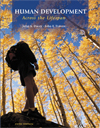 |  Human Development Across the Lifespan, 5/e John S. Dacey,
Boston College
John F. Travers,
Boston College
Middle Adulthood Physical and Cognitive Development in Middle Adulthood
Learning ObjectivesAfter reading this chapter, the student should be able to complete the following goals:
1Identify health concerns of importance to middle-aged adults. |
 |  |  | 2Discuss the relationship between weight and metabolism in middle age. |
 |  |  | 3Outline the effects of alcohol in middle age. |
 |  |  | 4Discuss how muscular and sensory abilities change in middle age. |
 |  |  | 5Discuss the climacteric as it occurs in both females and males. |
 |  |  | 6Explain the role of hormone treatments in dealing with the climacteric and other aspects of aging. |
 |  |  | 7Examine the debate on the decline of intelligence with age. |
 |  |  | 8Present new views of intelligence and discuss the relationship between memory and intelligence. |
 |  |  | 9Outline the qualities that distinguish highly creative adults from their average peers. |
 |  |  | 10Compare and contrast the findings of Lehman and Dennis on the development of creativity and age, and present Simonton's attempt at resolution. |
 |  |  | 11Present the obstacles and aids to creativity. |
 |  |  | 12Discuss factors that influence learning ability from early to late adulthood. |
 |  |  | 13Characterize the way in which the workplace is changing and the implications for training. |
 |  |  | 14List and discuss special problems of the working woman. |
 |  |  | 15Examine the midcareer crisis and suggest ways for dealing with the midcareer crisis. |
|



 2002 McGraw-Hill Higher Education
2002 McGraw-Hill Higher Education